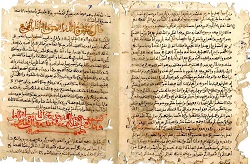The power of language and the language of power in Medieval Western Islam
North Africa and Southern Spain were united politically during the 11th-13th centuries under a dynasty of Berber origins - the Almohad Empire extending from the Atlantic to Tripoli in present day Libya, and from current Mauritania in the South to the walls of Toledo in the Iberian peninsula to the North – the largest ever European-African Empire. The translation from Arabic and analysis of rare documents from the period by scholars funded by the EU has shed light on how the rulers of the Almohad dynasty used highly literary language to bolster their legitimacy and assert their authority across their vast Empire. In particular, the Almohads sidelined the ulemas in interpreting the law, so that the Almohad Empire (1130-1269) effectively ceased to refer to the authority of Middle-Eastern Islam. Instead its rulers designated themselves caliphs and promoted an independent ideology. Over the six-year duration of the IGAMWI project, which ended in September 2016, Pascal Buresi, Research Professor at the National Centre for Scientific Research (CNRS) and Professor at the School for Advanced Studies in the Social Sciences (École des Hautes Études en Sciences Sociales or EHESS) in Paris and his team edited and translated into French and English, the letters of the Chancery – the department of correspondence and records of the Almohad Royal Court. Some 300 Chancery documents have survived in Morocco, Tunisia, Spain and Italy. They include letters about military victories and defeats, the ruler’s speeches on imperial decisions and general policy, nominations of imperial civil servants and letters of information from the provinces to the Almohad ruler. They have been key in shedding a new light on a historical period known only from narrative histories of the Maghreb, ‘often written long after the events they describe and offering only a partial view,’ Professor Buresi says. Rhetorical language ‘The biggest challenge for us was the rhetorical language of the documents,’ says Professor Buresi. The public servants working in the Chancery called the ‘Diwana-l-Insha’ or Office of [literary] Creation were all highly educated men who knew poetry, literature, law and the Koran. ‘They wrote in rhymed prose and were often playing with language, with rhetorical innovations characteristic of great works of literature. Yet it is also an administrative language linked with the law - those letters were the creation of the law of the Empire and they became the specific voice of the authority of the Almohad rulers,’ continued Professor Buresi. ‘They could take a word from the Koran and gave it a different meaning. So, openly they were claiming to be faithful to tradition, and able to say it was the true Arabic and Islam, but in fact they were innovating, and creating a new Islamic language of power.’ However, this also meant modern dictionaries could not help researchers understand the real intent of the texts. Fortunately, the research team also found Chancery manuals which explained how the letters should be written and the correct forms of words to use in different circumstances. There were hundreds of pages of explanations and rules, but also examples of missives which enabled researchers to decipher and interpret the language used. Reorganisation of structures The documents yielded important hitherto unknown information. ‘It is clear from these documents that the Almohad dynasty strove to reorganise the structures of power and authority to its own advantage,’ says Professor Buresi. He and his team of four scholars are publishing three books based on their analysis of the documents. Starting with the dynasty’s founder Ibn Tumart (d. 1130), the Almohad rulers assumed the title of Caliph to claim for themselves alone the authority to interpret divine law, reversing the previous power structure which put jurists and ulemas above the political power of the Caliphs. ‘It was revolutionary, because it broke with the social, political, judiciary and ideological system that prevailed before,’ says Professor Buresi. ‘What emerged was a new Almohad dogma that was a synthesis of all the previous religious trends of Islam.’ For more information, please see: CORDIS project page
Countries
France



